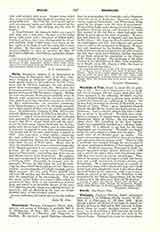

Welte, BENEDICT, exegete, b. at Ratzenried in Wurtemberg, November 25, 1825; d. May 27, 1885. After studying at Tubingen and Bonn, where he made special studies in the exegesis of the Old Testament and in Oriental languages, he was ordained priest when twenty-eight years old. Soon after this he became assistant lecturer at Tubingen, and in 1840 regular professor of Old Testament exegesis. During the next two decades Welte was remarkably active in literary work connected with his favorite subject. This, indeed, more than the classroom was the field of his life’s achievements. An extensive familiarity with Oriental tongues, a talent for thorough research, and a clear, precise diction were his special qualifications. He published at Freiburg, in 1840, “Historischkritische Einleitung in die hl. Schriften des alten Testamentes”. Much of the material for this work had been gathered by his predecessor, Herbst, who left a request that Welte should finish and edit his notes. It cost the latter great labor, for he was not in sympathy with the method of Herbst; and at times found it necessary to append his own views and arguments. The second part of the same work began to appear in 1842. Two years later, a third volume, completing the task, published as “Specielle Einleitung in die deutero-canonischen Bucher des alten Testamentes” came from the pen of Welte alone. Before this, in 1841, the translation of Gorium’s Armenian biography of St. Mesrob appeared in the university annual publication. In the same year he wrote “Nachmosaisches im Pentateuch“, contending that there was no post-Mosaic matter in the Pentateuch. His explanation and translation of the Book of Job was published at Freiburg, 1849. Meanwhile, in company with the orientalist Wetzer, he had begun his real life-work. Together they edited the 12 volumes of the “Kirchenlexikon”, an encyclopedia of Catholic theology and its allied sciences. To this work Welte himself contributed 200 articles, and his literary activity closed with the completion of the encyclopedia. This was due partly to the duties of a canon’s office which he assumed, May 22, 1857, at the cathedral of Rottenburg, and partly to an incurable disease of the eyes. This affliction, and the still greater suffering because of inactivity, did not diminish in the least the simple childlike piety of this scholarly priest.
JOHN M. FOX

